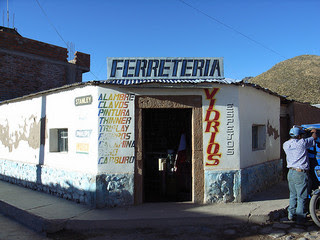The Latin connection
 |
| A rural Latin American tienda Photo credit: Los viajes del Cangrejo licensed CC BY 2.0 |
This Latin suffix came into English in the form of “-ary” and gave us words like “apothecary” (a pharmacist in medieval English), “monetary”, “imaginary”, “library”, and many more. The English suffix, however, takes on a wider range of meanings than its Latin ancestor and has the effect of turning the word into a noun as well as an adjective, depending on the context.
It is this Latin suffix that exists in modern Spanish as -ería with a more or less similar effect. So, a store that sells zapatos (shoes) becomes a zapatería (shoe-store) and another selling joyas (jewelry), a joyería (jewelry store). In this article, we will explore how some of the most common stores are named in Spanish; if you ever wish to travel to a Spanish-speaking country, you want to know them like your alphabet!
The stores in Spanish
Here’s a list of names for some of the most ubiquitous stores you are going to find in a typical Spanish-speaking marketplace. The list is far from complete but assimilating these words would enable you to read and interpret correctly almost any sign you see in a Hispanic bazaar. The list below will not only give the English translations of these names but also etymological cues to help you retain them longer.
cafetería — coffee shop, snack bar (note the word, cafe that stands for “coffee”)
carnicería — butcher shop (carne is the Spanish for “meat” and shares a common origin with the prefix, “carni-” in the English word for a meat-eater, “carnivore”)
cervecería — brewery, bar (cerveza is the Spanish for “beer”)
confitería — candy store (it is possible that the Spanish for “candy,” confite is connected in some way with the English word, “confectionary”)
 |
| A ferretería Photo credit: Nicolas Nova licensed CC BY 2.0 |
droguería — drugstore, variety store
ebanistería — cabinet shop, place where cabinets are made (ebano is the Spanish for “ebony,” a type of wood; and perhaps this is the wood most often used for making cabinets)
ferretería — hardware store (this could have possibly come from ferrum, the Latin for “iron” and the fact that traditionally hardware stores have been selling most stuff made in iron, e.g., nails, tools, wires, rods, etc.; incidentally, a Spanish word for “iron” is fierro that obviously comes from ferrum)
floristería — flower shop
frutería — fruit shop
heladería — ice-cream parlor (helado is the Spanish for “ice” and possibly shares its etymology with the English word, “hail” that is also a form of ice)
herrería — blacksmith's shop (this comes from hierro, the Spanish for “iron”; interestingly, “iron” has two words in Spanish, hierro and fierro, the latter being preferred in Latin America)
juguetería — toy shop (the Latin word, iocor gave English its “joke”, “jest”, and “play” and came to be adopted by Spanish as jugar meaning “to play”)
lavandería — laundry (the Spanish verb, lavar, which means “to wash”, gave birth to this word for “laundry”)
lechería — dairy (English has a prefix, “lacto-” which means “milk-related”; this prefix comes from the Latin word for “milk”, lactis, which became leche in Spanish)
lencería — linen shop, lingerie shop (an easier way to remember this word is to imagine using binoculars powerful lenses to secretly watch your sexy neighbor change her lingerie!)
librería — bookstore (the English word, “library” sounds similar but doesn’t mean the same, be careful!)
 |
| A panadería Photo credit: Daniel Lobo licensed CC BY 2.0 |
panadería — bakery (imagine toasting a piece of bread in a pan because your toaster is not working; this visualization should help you remember that pan is the Spanish for “bread”)
papelería — stationery store (the Spanish word, papel means “paper” in English and the two words share a common Latin origin)
pastelería — pastry shop (pastel is the Spanish for “pastry”)
peluquería — hairdresser's shop, beauty shop, barbershop (peluca, the root for this word, is the Spanish for “wig” and derives from the Spanish word for “hair”, pelo)
pescadería — seafood store (pez is the Spanish for fish)
perfumería — fragrance shop, perfume store
pizzería — pizzeria, pizza parlor
sastrería — tailor's shop (the Spanish for “tailor” is sastre, so his shop is naturally a sastrería)
sombrerería — hat shop, hat factory (this one comes from the word, sombrero which means “hat”)
tapicería — upholstery shop, furniture store (tapiz of Spanish and “tapestry” of English share a common origin and mean the same thing)
tintotería — dry-cleaner's (since, traditionally dry-cleaners have also been dyers in the Spanish society, the word for dyers has stuck till today; tinto is the Spanish for “dye” among other things)
verdulería — produce store, greengrocer's, vegetable market (verde means “green” and, by extension, “verdura” means “green vegetables” which is what a verdulería sells)
















0 comments:
Post a Comment